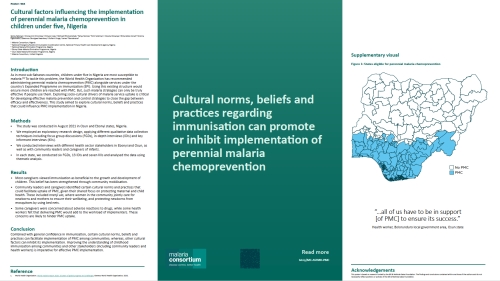
Publication Date:
01/11/2022
Author:
Semiu Rahman
Omowunmi Omoniwa
Chinazo Ujuju
Michael Ekholuenetale
Yahya Hamzat
Yemi Suleiman
Olusola Oresanya
Binta Aduke Ismail
Nnenna Ogbuluafor
Lawrence Oburigwe Nwankwo
Olufemi Oroge
James Tibenderana
Type:
Poster

Cultural factors influencing the implementation of perennial malaria chemoprevention in children under five
Publication Date:01/11/2022
Author:
Semiu Rahman
Omowunmi Omoniwa
Chinazo Ujuju
Michael Ekholuenetale
Yahya Hamzat
Yemi Suleiman
Olusola Oresanya
Binta Aduke Ismail
Nnenna Ogbuluafor
Lawrence Oburigwe Nwankwo
Olufemi Oroge
James Tibenderana
Type:
Poster
Cultural norms, beliefs and practices regarding immunisation can promote or inhibit implementation of perennial malaria chemoprevention in Nigeria.
As in most sub-Saharan countries, children under five in Nigeria are most susceptible to
malaria. To tackle this problem, the World Health Organization has recommended administering perennial malaria chemoprevention (PMC) alongside services under the country's Expanded Programme on Immunization. Using this existing structure would ensure more children are reached with PMC. But, such malaria strategies can only be truly effective if people use them. Exploring socio-cultural drivers of malaria service uptake is critical for developing effective malaria prevention and control strategies to close the gap between efficacy and effectiveness. This study aimed to explore cultural norms, beliefs and practices that could influence PMC implementation in Nigeria.
This poster was presented at the 71st annual meeting of the American Society of Tropical Medicine and Hygiene.
Country: Nigeria
Keywords: Malaria | MNCH | PMC | Research | SDGs
« Back to Publications